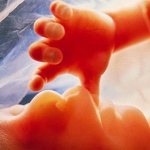Written by Kathy Clubb
And she brought forth her firstborn son and wrapped him up in swaddling clothes and laid him in a manger; because there was no room for them in the inn. (Luke 2:7)
The virtue traditionally connected with the third Joyful mystery of the Rosary, the Nativity of the Lord, is a love of poverty and love of the poor. Naturally, as the great feast of Christmas draws near, it is common to contemplate more deeply the circumstances surrounding Christ’s birth, particularly the fact that as God, He chose to be born in the abject poverty of a stable.
This simple setting for the God-Man’s dramatic entrance into the world stands in great contrast to our modern commercialised Christmas, where the glitz, the sales, the gimmicks and the banal muzac threaten to leave no room for the Christ-child to be born anew in our hearts. But thankfully Holy Mother Church offers an antidote to consumerist culture: the traditional nativity scenes we set up in our homes, the religious Christmas cards we exchange, touching hymns and carols and Advent Masses all help to maintain our inner stables as we await the Lord’s coming.
As pro-life Christians, the birth of Christ carries extra significance, as the feast day of the most momentous birth in history brings into focus the evil of abortion. We know that although many women who abort their babies are poor, this drastic solution to an unwanted pregnancy is not limited to the materially poor. This calls to mind the words of St Theresa of Calcutta, who said that it is a poverty for a child to die so that we may live as we wish – there is more than one kind of poverty and St Theresa often pointed out the great poverty of those in affluent Western nations who neither know the love of Christ nor the solace of human friendship. To take the life of a child shows a serious deficiency of faith, hope and charity; it is a poverty of the most valuable of virtues.
By contrast, to welcome a child into an already full home or at a time of financial hardship is a sign of true, spiritual wealth, the kind that continues into eternity. Thus the Christmas events poignantly show us a hierarchy of poverty: with the loss of God being the most extreme of all losses and material poverty being the least harmful to our souls.
Against his background of the Christmas message of swaddling bands and shepherds, of the love of poverty and of the preeminence of opposition to abortion, it is disappointing to see the reemergence of an ideology which downplays abortion and treats poverty itself as the worst scourge on the earth. This ideology takes its name from an item of clothing worn by the adult Christ at the end of his life: the “Seamless Garment.”
The soldiers therefore, when they had crucified him, took his garments, (and they made four parts, to every soldier a part,) and also his coat. Now the coat was without seam, woven from the top throughout. They said then one to another: Let us not cut it, but let us cast lots for it, whose it shall be (John 19:23-24)
The term, “Seamless Garment,” was first applied to pro-lifers in 1976 by the late, now-disgraced Cardinal Joseph Bernadin of Chicago and has been viewed with suspicion by authentic pro-lifers since that time. The American Life League warned that this concept would be the ‘death of the pro-life movement’[1], and wherever it has been adopted, pro-life efforts have fractured and floundered. One current incarnation of the Seamless Garment initiative the “New Pro Life Movement”[2], which is anti-Trump, anti-gun and anti-detention for illegal immigrants. (Among their few ‘pros’ are contraception and feminism.)
The ideology has permeated parishes, dioceses and religious orders, most notably the Jesuits, who while claiming to be against abortion, are far more outspoken about fashionable causes like immigration and the death penalty. Liberal Catholics who espouse the Seamless Garment commonly redefine the Church’s social teaching and tend to believe that the virtue of charity towards the poor was unheard of within the Church until the 1970’s.
This present article was sparked by one republished on the Diocese of Parramatta website[3]. It was written by a Catholic nun, Sr Nuala Kenny, who writes that her whole life has been dedicated to the pro-life cause. However, as Sr Kenny is from the Seamless Garment school, she has a rather different take on terminology and priorities from that of the average pro-lifer.
Sr Kenny defines the term “pro-life” as the “commitment to a consistent ethic for the full and seamless web of life.” By her definition, US President Donald Trump is not pro-life, as ‘all he does’ is legislate against abortion. Rather, according to Sr Kenny and the Seamless Garment cabal, it is Joe Biden who is really pro-life, as Biden is a “faithful, practising Catholic with a long record of practical witness to Catholic social teaching” and who is “personally opposed to abortion, [as] he is president for all and recognises the separation of Church and state.”
By “recognising the separation of Church and State”, Sr Kenny means that legal abortion “must be respected.”
Liberals like these commonly spout a stream of criticism against those who don’t share their particular, skewed, interpretation of Catholic teaching. But rarely is there any criticism of the opportunistic abortion providers, or of the pharmaceutical companies that manufacture abortion pills and tools, or indeed of the powerful politicians, lobby groups and corporations who support abortion. That list comprises the people and entities that gain financially from the killing of tiny babies. Like vampires, they live off the misfortune of women, suck the life from them and cast those unfortunates – and their babies, sometimes literally – into the gutter. Yet somehow, it is pro-life politicians like Trump and faithful Catholic men and women who are singled out for failing to be pro-life enough?
Salt is further rubbed into wounds of conscientious Catholics when liberals self-righteously proclaim the imperative of distributing Holy Communion to pro-abortion politicians. Those same Catholic pro-lifers reviled by the liberal Seamless-Garmenters would die before receiving Holy Communion in a state of serious sin and would willingly skip Communion if they had inadvertently violated the least rule for worthy reception of Communion, like arriving too late at Mass, or failing to fast for long enough. But bad Catholics who monstrously, publicly, unrepentantly support abortion and other immoral practices are, in the name of inclusion and mercy, encouraged by the progressives to approach the table of the Lord and to sacrilegiously receive His Sacred Body.
However, the scandal of sacrilegious Communions apparently isn’t enough. In her article, Sr. Kenny draws an equivalence between killing babies and “crimes” like supporting capitalism and polluting the environment: deny Holy Communion to a supporter of one, then Communion must be denied to supporters of all. The good sister also extends the Communion prohibition to those who support the death penalty, which means that popes like Innocent III and saints like Thomas Aquinas, Augustine, John Henry Newman, Robert Bellarmine and Alphonsus Ligouri[4] should all have been denied Holy Communion, as they all approved of the death penalty.
Unfortunately, the Seamless Garment concept has made its way to the highest echelons of the Church, as can be seen in Pope Francis’ encyclical, Gaudete et Exsultate, which Sr Kenny uses to justify her disdain for making abortion a priority.
“Our defence of the innocent unborn, for example, needs to be clear, firm and passionate, for at stake is the dignity of a human life, which is always sacred and demands love for each person, regardless of his or her stage of development. Equally sacred, however, are the lives of the poor, those already born, the destitute, the abandoned and the underprivileged, the vulnerable infirm and elderly exposed to covert euthanasia, the victims of human trafficking, new forms of slavery, and every form of rejection.” [5]
The Pope is completely accurate when he states that all human life is always and equally sacred. However, it is wrong to say that a child’s dignity is threatened by the act of abortion. Human dignity is from God and is inherent, thus can never be removed. At risk, however, is the child’s actual life, his future, his destiny in God – this is something that has already been given to other victims mentioned in the quote above. This is what makes abortion unique within the litany of horrific abuses perpetrated against humanity; it is an attack on life itself and on the life of one who is completely and utterly without the power to fight back.
A second fact that distinguishes abortion from other crimes against humanity is its sheer scale. All cases of trafficking, euthanasia and abuse are tragic and must not be trivialised by a casual comparison of numbers. However, it can’t be denied that the blood of millions of aborted babies cries to heaven in a deafening roar and calls down God’s vengeance onto the earth.
There are ten words from Scripture that are at the very soul of Monsignor Reilly’s apostolate. They were silently repeated by the infant Jesus, in the depths of His Divine Heart, as He lay in the manger, wrapped in swaddling clothes. Those same words were uttered aloud by Jesus from the Cross, as the guards below Him cast lots for His seamless robe. They must become our prayer now, as we are faced with influential Catholics who seek to downplay the primacy of ending abortion, who condone the use of abortion-tainted vaccines, who give Holy Communion to bad Catholic politicians: “Father, forgive them, for they know not what they do.”










